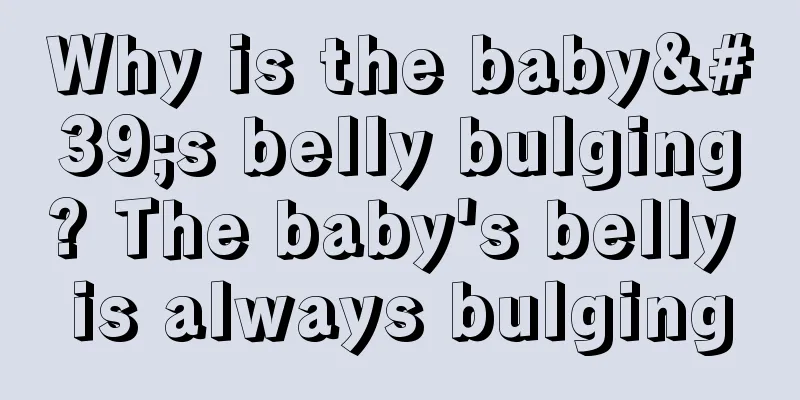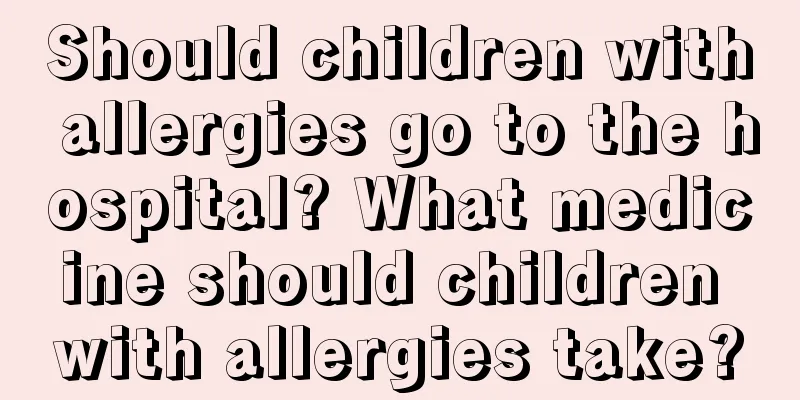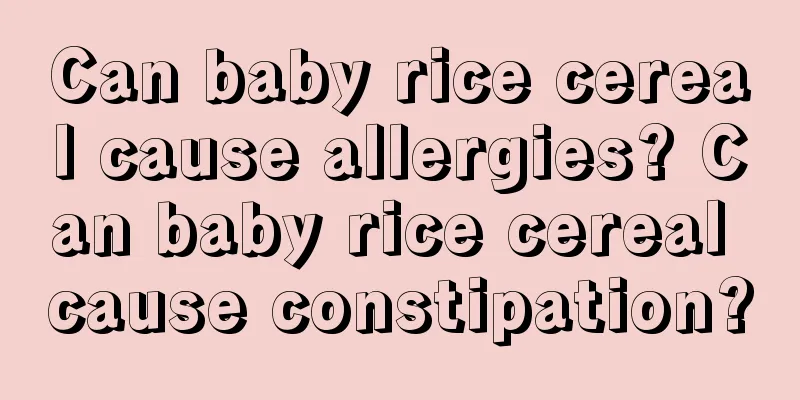Why is the baby's belly bulging? The baby's belly is always bulging

|
We need to always pay attention to the baby's physical health. We will find that many babies have bulging bellies, which look bigger than adults' bellies, like a ball. This is a very normal phenomenon. What's going on with my baby's bulging belly?Reason 1: When the abdominal muscles are not strong enough, the abdomen will appear more prominent, especially when the baby is held, the abdomen will appear to be protruding and sagging. In addition, the baby's body is round from front to back, not slightly flat like an adult, which is also one of the reasons why the belly looks bloated. Reason 2: Babies are more prone to bloating than adults. Babies eat and suck too quickly, which causes them to inhale air into their stomachs. If the nipple hole of the bottle is not the right size, air can enter the baby's body through the gap of the nipple. In addition, babies cry too much and inhale air. When babies eat milk or other food, it ferments in the digestive tract through the action of intestinal bacteria and other digestive enzymes, producing a large amount of gas, which can cause bloating. Reason 3: Indigestion and constipation cause feces to accumulate in the intestines, which promotes the proliferation of gas-producing bad bacteria. Or milk protein allergy, lactose intolerance, enteritis, etc. cause digestion and absorption problems, which easily produce large amounts of gas. Reason 4: Enlarged organs or tumors in the abdominal cavity. The obstruction of the baby's lower intestine is also mainly abdominal distension. If the baby can eat, defecate, does not vomit, the stomach feels soft, the baby is active, the gas is normal, and the weight gain is normal, this type of abdominal distension is mostly functional abdominal distension, and no special treatment is required, just take preventive measures. However, if there are any abnormal symptoms, you should see a doctor. Baby's belly is always swollen1. Swallowing too much air - For babies fed with formula, if the baby sucks too quickly, the nipple flows too fast, or the bottle is tilted at the wrong angle, air will enter the nipple, causing the baby to inhale more air. When babies who are bottle-fed drink breast milk, because the mother's nipple is sunken or not completely attached to the nipple, the baby will also swallow some air. In addition, the baby's crying for a long time will also cause the baby to inhale a lot of air, which will cause abdominal distension. 2. Indigestion and constipation - Babies who have started to add complementary foods, if they eat foods such as sweet potatoes, potatoes, beans, etc. that are high in starch, difficult to digest and easy to cause flatulence, or indigestion caused by milk allergy, lactose intolerance, etc., will easily produce a lot of gas in the intestines. If the baby is constipated, the accumulation of intestinal excrement will cause the growth of harmful bacteria that produce gas, which will also cause flatulence. 3. Physiological factors: The baby's body is round from front to back, not slightly flat like an adult's, which is one of the reasons why the baby's belly looks "bulgy". In addition, the baby's belly has to accommodate the same number of internal organs as an adult, but the baby's abdominal wall muscles are not yet fully developed and do not have enough strength to accommodate these abdominal organs, resulting in an abnormally protruding abdomen. 4. Other pathological factors: diseases such as enlarged abdominal organs, intestinal obstruction, ascites, etc. can also cause abdominal distension. Severe intestinal obstruction in infants and young children is often discovered soon after birth due to obvious symptoms. If the baby is just bloating, and the baby's ability to eat, drink, play, and other activities are normal, and the baby is in good spirits, parents do not need to worry too much. Tips to relieve baby's flatulence1. Feed your baby promptly and burp him/her Don't let your baby be hungry for too long before feeding. If your baby is hungry for too long, he will suck too quickly and swallow a lot of air. So you should feed your baby on time, and after feeding, gently pat your baby's back to promote burping and expel gas from the esophagus. You can also pat your baby when you change sides during feeding or when your baby lets go of the nipple/pacifier. 2. Reduce the time your baby cries It is easy for a baby to get bloating when he cries. In this case, you should give him more comfort or hug him to avoid worsening of bloating by adjusting his emotions. 3. Go out more There are so many benefits to letting your baby lie on his back more often! It not only prevents flat heads, but also allows the air that gets into the baby's stomach to escape. If your baby has colic, it can also effectively relieve it and increase the strength of the baby's neck. 4. Move your legs and massage more Let the baby lie on his back, hold his legs, bend his knees or help him rotate his legs like riding a bicycle. Massage the baby's abdomen more often, and massage clockwise for 5 minutes. Be careful to move gently! If the baby's umbilical cord has not fallen off, avoid the belly button when massaging. 5. Choose the right pacifier When drinking from a bottle, the baby usually swallows more air. Pay attention to the size of the nipple hole. If the hole is too small, the baby needs to suck hard and swallow a lot of air easily. If it is too big, the baby may choke on the milk. You can turn the bottle upside down with the nipple facing down. If the milk flows out at a speed of about 1 drop per second and stops dripping after a few seconds, it is the most suitable speed. 6. Breastfeeding mothers should pay attention to their diet Breastfeeding mothers can also pay attention to whether they have eaten foods that are easy to cause flatulence, such as beans, onions, cabbage, etc. You should also pay attention to foods with high sugar content. If there is too much sugar in breast milk, the sugar will ferment excessively in the baby's stomach, which can easily cause the baby to have intestinal flatulence and foamy stools. However, food is not the only cause of flatulence, so there is no need to put these foods aside at once. Balanced nutrition is very important during breastfeeding. 7. Pay attention to feeding posture when breastfeeding If the baby's mouth is not properly placed on the mother's breast when the baby is breastfeeding, the baby may inhale too much air, resulting in hiccups or bloating. The correct posture is to let the baby's face face the mother's breast to ensure that his mouth covers the nipple and areola. What to do if your baby has bloatingAfter feeding, gently pat the baby's back to promote burping and expel gas from the stomach and intestines. Some babies will expel gas by passing gas. Relying on the absorption of the intestinal wall, it can also relieve abdominal distension. In addition, diseases such as enlarged abdominal organs, intestinal obstruction, and ascites can also cause abdominal distension. Severe intestinal obstruction in infants and young children is often discovered shortly after birth due to obvious symptoms. |
<<: What are the benefits of babies learning to paint? How to teach babies to paint
Recommend
What does a baby's startle reaction look like? What should I do if my baby startsle frequently?
Mothers who have given birth to babies may have n...
Does breastfeeding prevent breast cancer? Does not breastfeeding cause breast cancer?
Can breastfeeding prevent breast cancer? Today, l...
How long does it take for a baby's fever to subside? How long does a baby's fever last?
When a baby has a fever and is sick, it will make...
How can breast hyperplasia be cured? Can breast hyperplasia be cured?
Breast hyperplasia is classified as a chronic dis...
Can I get my nails done while preparing for pregnancy? Does getting my nails done while preparing for pregnancy have any impact?
Having a baby has become a necessary process for ...
What is malposition of the fetus? Pictures of malposition of the fetus. Teach you how to correct it
One of the most feared things when giving birth i...
How to induce labor when the due date comes? What to eat when the due date comes?
Some parents are anxious when their stomachs stil...
I used a pregnancy test stick to detect pregnancy but I still have my period. What's going on?
Many women have the habit of using pregnancy test...
Why can't I get pregnant during ovulation?
Ovulation is the best time for women to get pregn...
What is the difference between amniotic fluid index and amniotic fluid depth? What should I do if the amniotic fluid index is too low?
The amniotic fluid index is an important indicato...
What is the best material for baby sleeping bags? Top 5 fabrics
The best material is of course pure cotton, becau...
How to get your baby to speak as early as possible
The language development progress of each infant ...
Will taking folic acid affect ovulation? Will taking folic acid affect ovulation?
Girls are always very sensitive when preparing fo...
Which country's brand is Dettol? Is Dettol disinfectant safe?
Everyone should be familiar with the brand of Det...
How effective are BabyBanz sun protection swimsuits? How effective are BabyBanz sun protection swimsuits?
How is the BabyBanz sun protection swimsuit? Chil...









